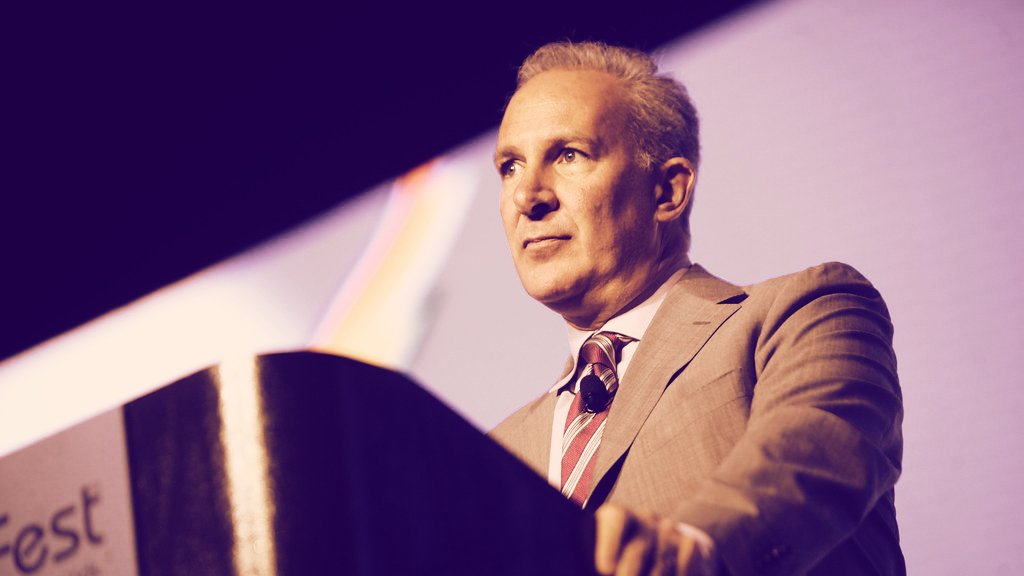Peter Schiff Blasts U.S.-China Trade Deal as a Strategic Surrender
13.05.2025 15:00 2 min. read Alexander Stefanov
Economist Peter Schiff isn’t buying the fanfare around the latest U.S.-China tariff deal. In his view, Washington just blinked.
After a round of negotiations in Geneva, the two countries agreed to pause parts of their trade war by reducing tariffs for 90 days—down to 30% on Chinese imports into the U.S., while Beijing holds steady at 10% on American goods. Schiff was quick to criticize the imbalance, calling it a “loss disguised as diplomacy.”
“This isn’t a breakthrough—it’s a bluff retreat,” Schiff wrote on X, claiming the U.S. gave up leverage without securing meaningful concessions. Critics argue the deal’s structure favors China and burdens American households, who are already projected to face an average of $1,300 in extra costs due to tariffs in 2025.
While Trump hailed the temporary rollback as “great progress” on Truth Social, skeptics suspect political motives. Schiff even suggested the timeline and figures may have been tailored to benefit allies close to the administration.
Despite public statements from U.S. officials labeling the deal a step forward, key tariff frameworks remain intact. Duties imposed before April 2025, including those under Section 301 and national security measures, will continue.
Chinese officials remained cautious, reiterating that future negotiations must align with their national development interests. Both sides confirmed plans to resume talks but offered no details beyond general optimism.
Whether this is a true de-escalation or just a timeout remains to be seen. For now, the clock is ticking on another 90-day countdown.
-
1
U.S. PCE Inflation Rises for First Time Since February, Fed Rate Cut Likely Delayed
27.06.2025 18:00 1 min. read -
2
Key U.S. Economic Events to Watch Next Week
06.07.2025 19:00 2 min. read -
3
Gold Beats U.S. Stock Market Over 25 Years, Even With Dividends Included
13.07.2025 15:00 1 min. read -
4
U.S. Announces Sweeping New Tariffs on 30+ Countries
12.07.2025 16:30 2 min. read -
5
US Inflation Heats Up in June, Fueling Uncertainty Around Fed Cuts
15.07.2025 16:15 2 min. read
US Inflation Heats Up in June, Fueling Uncertainty Around Fed Cuts
U.S. inflation accelerated in June, dealing a potential setback to expectations of imminent Federal Reserve rate cuts.
Gold Beats U.S. Stock Market Over 25 Years, Even With Dividends Included
In a surprising long-term performance shift, gold has officially outpaced the U.S. stock market over the past 25 years—dividends included.
U.S. Announces Sweeping New Tariffs on 30+ Countries
The United States has rolled out a broad set of new import tariffs this week, targeting over 30 countries and economic blocs in a sharp escalation of its trade protection measures, according to list from WatcherGuru.
Key U.S. Economic Events to Watch Next Week
After a week of record-setting gains in U.S. markets, investors are shifting focus to a quieter yet crucial stretch of macroeconomic developments.
-
1
U.S. PCE Inflation Rises for First Time Since February, Fed Rate Cut Likely Delayed
27.06.2025 18:00 1 min. read -
2
Key U.S. Economic Events to Watch Next Week
06.07.2025 19:00 2 min. read -
3
Gold Beats U.S. Stock Market Over 25 Years, Even With Dividends Included
13.07.2025 15:00 1 min. read -
4
U.S. Announces Sweeping New Tariffs on 30+ Countries
12.07.2025 16:30 2 min. read -
5
US Inflation Heats Up in June, Fueling Uncertainty Around Fed Cuts
15.07.2025 16:15 2 min. read


